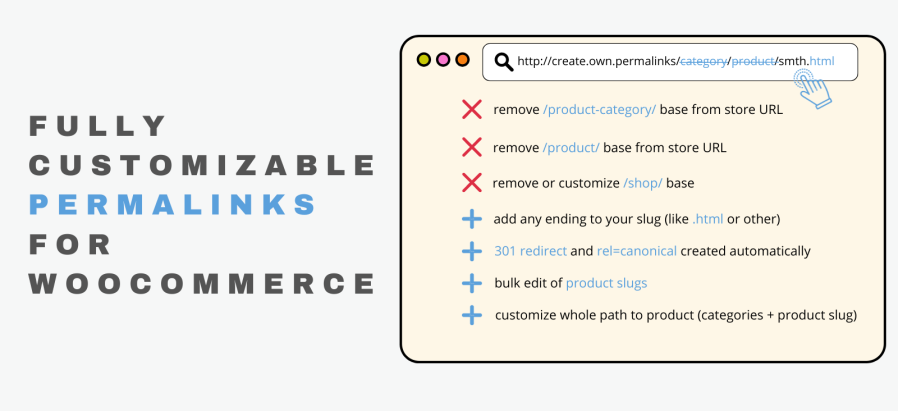
Active installs
800
Subscription includes
Support
Custom Permalinks for WooCommerce helps you set up any URL you want for your store. For instance, use a custom choice like site.com/category-name/product-name path instead of an assigned URL.
Use Custom Permalinks for WooCommerce if you:
Remove /product-category/ from store permalinks, so the category slug is right after the domain name.

Remove the /product/ part of permalinks. You can leave the product slug alone right after the domain name or create a custom permalink structure with product slug + category slug combination.
Besides setting up general products permalink patterns for the whole store, you can also choose a permalink structure for each product independently.

Remove /product-category/ and replace it with a category slug for a product permalink. For instance, the URL may look like this:
site.com/laptops/mackbook-pro
Create an entire product path using the parent category (if the product places in the second-level category), for instance:
site.com/electronics/laptops/mackbook-pro
That may make your product URL easier to understand for crawlers.

You can choose to have or remove /shop/ base for both product and category permalinks to any custom URL you create.
If you are currently editing permalinks on existing products and categories, you may want to use 301 redirects. When you enable 301 redirects, when anyone goes to the old URL, they will redirect to the corresponding new URL. You won’t lose any clients.
The code informs search engines that a specified URL is the master copy of a page. Use this code, and you don’t need to worry about duplicate content issues that could affect your site’s performance.
Some platforms and frameworks are still using old-fashioned URLs with .html, .htm, .php, .asp, or any other extensions at the end of URLs. You may want to replicate that type of URL and not lose any search volume or direct website visits. Custom Permalinks for WooCommerce allows you to specify any permalink extension. You are not limited to those listed above.

If you don’t want to use the default way to generate a product slug, use a SKU instead of a product title. You can switch between these two methods.

Both the Yoast SEO and The SEO Framework plugins offer a feature that allows you to assign a primary category to a product if it belongs to several categories. These primary categories can then be used by the Custom Permalinks plugin to create the full path to the product.
Inform search engine crawlers of your new permalinks. All newly established URLs are placed automatically on the Yoast SEO XML Sitemap.
You may wonder what URLs are possible to establish using the Custom Permalinks for WooCommerce extension? The following are some examples.
Product-based permalinks
yoursite.com/mackbook
yoursite.com/mackbook.html, yoursite.com/mackbook.htm, or yoursite.com/mackbook.php
yoursite.com/laptops/mackbook
yoursite.com/electronics/laptops/mackbook
yoursite.com/shop/laptops/mackbook
yoursite.com/electronics/laptops/481923-sku (SKU instead of regular slug)
yoursite.com/electronics/laptops/481923-sku.html
Category-based permalinks
yoursite.com/laptops
yoursite.com/laptops.html, yoursite.com/laptops.htm, or yoursite.com/laptops.php
yoursite.com/electronics/laptops
yoursite.com/shop/electronics/laptops
yoursite.com/electronics/laptops.html
Many other combinations are available to you in Custom Permalinks for WooCommerce plugin’s settings.
![]()
![]()
Categories
Extension information
Quality Checks
Compatibility
Countries
Languages